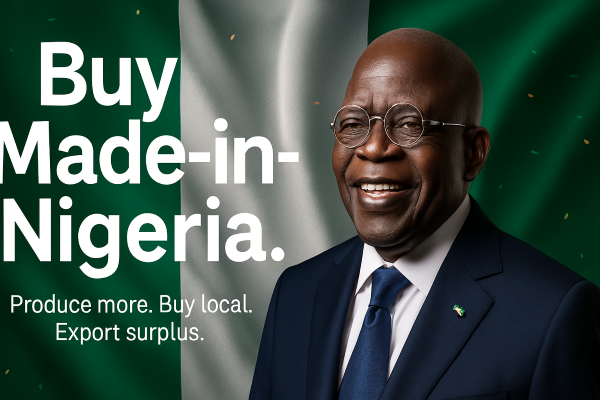Made-in-Nigeria: Tinubu Urges Nigerians to Buy Local

Marking Nigeria’s 65th Independence, President Bola Tinubu says he is turning the “Buy Nigerian” mantra into a national productivity brief: patronise locally made goods. Tinubu reiterated the need for Nigerians to patronise made-in-Nigeria products. According to him, we should be a nation of producers, not just consumers.
President Tinubu urged Nigerians to farm more, process more, pay taxes, and build factories. The push lands alongside upbeat macro signals—record non-oil revenue already above ₦20 trillion in 2025, ₦3.65 trillion in September alone (up 411% vs May 2023), and five straight quarters of trade surplus. Government says non-oil exports now make up 48% of outbound goods as manufactured exports jump 173%.
“I urge the sub-national entities to join us in nation-building. Let us be a nation of producers, not just consumers. Let us farm our lands and build factories to process our produce.
“Let us patronise ‘Made-in-Nigeria’ goods. I say Nigeria first. Let us pay our taxes,” Tinubu said.
What the President Said — and Why It Matters
“Let us be a nation of producers, not just consumers… Let us patronise Made-in-Nigeria goods. Nigeria first.”
Tinubu tied the call-to-action to three levers:
- Fix the “plumbing”—ongoing fiscal/administrative reforms.
- Turn on productivity taps—farm, process, manufacture.
- Pay your taxes—fund the state to deliver at scale.
Why it matters: Local demand is the cheapest financing a manufacturer can get. Every naira redirected to Nigerian products anchors jobs, FX savings, and factory utilisation—the fastest path to lower unit costs and price stability.
The Numbers at a Glance
- Non-oil revenue (2025 YTD): ₦20tn+ achieved by August.
- September non-oil revenue: ₦3.65tn (+411% vs May 2023).
- Trade balance: 5 consecutive quarters of surplus; Q2-2025 surplus ₦7.46tn (~$4.74bn), +44.3% QoQ.
- Export mix: Non-oil 48% vs oil 52%—a marked shift toward diversification.
- Manufactured exports: +173%.
Signal: The macro tide is finally supporting the “Make Here, Sell Here, Export More” thesis.
Policy Chorus: Industry & Export Agencies
- Industry, Trade & Investment: Dr Jumoke Oduwole frames Made-in-Nigeria as the route to growth, jobs, and national development—“produce what we consume; buy what we produce.”
- NEPC: Dr Nonye Ayeni pledges end-to-end exporter support—from farm-gate capacity to market access.
BRANDECONOMY Analysis: Converting Sentiment into Sales
1) Demand Pull: The 10-Item Switch
A practical path to scale is household and institutional switching—move 10 everyday items (rice, flour, edible oils, beverages, detergents, apparel basics, toiletries, tiles, paint, furniture) to local brands. The compounding effect boosts factory run-times, unlocks supplier finance, and lowers per-unit costs.
2) Public Procurement as Market Maker
Direct school feeding, hospital, uniform, furniture, and construction procurement to compliant Nigerian manufacturers. Tie LPOs to quality, on-time delivery, and tax compliance, not just price.
3) Retail Shelf Discipline
Modern trade and e-commerce should commit prime shelf space and search placement to locally made SKUs. Results-based rebates (sell-through targets) de-risk the switch.
4) FX & Working-Capital Relief
Maintain duty relief on inputs that have no local substitutes; accelerate export proceeds access for manufacturers; expand invoice-discounting for suppliers with verified LPOs.
5) Standards, Not Slogans
Scale SON/NAFDAC fast-track for SMEs meeting baseline standards; publish public white-lists of compliant factories to help buyers choose confidently.
What Producers Should Do Now
- Price to win, then hold share with quality and after-sales.
- Localise inputs where feasible (packaging, labels, spice blends, fasteners).
- Tell origin stories on packs and in content—state, farm, factory—to convert patriotism into purchase.
- Push export-ready SKUs into ECOWAS with AfCFTA logistics partners.
What Consumers Can Change This Week
- Swap three pantry items, two home-care items, and one apparel/basic furniture item to Made-in-Nigeria.
- Ask retailers for local alternatives; reward stores that stock and signpost Nigerian brands.
KPIs to Watch (Next 12 Months)
- Manufacturing PMI trend and factory capacity utilisation.
- Non-oil export share breaching 50%+ of total exports.
- Retail sell-through of Nigerian brands in modern trade and e-commerce.
- Jobs created across food & beverage, textiles, home goods, and building materials.
BRANDECONOMY Take
Thesis: The “Buy Nigerian” call hits different when the math is positive—₦20tn+ non-oil revenue, 5 quarters of trade surplus, and manufactured exports up 173%. Sustained momentum now hinges on procurement discipline, retail shelf access, dependable power, and standards enforcement. Get those right and patriotism becomes price-competitive.Bottom line:Produce more. Buy local. Export surplus. That is how Nigeria turns pride into prosperity—one cart, one factory, one quarter at a time.










